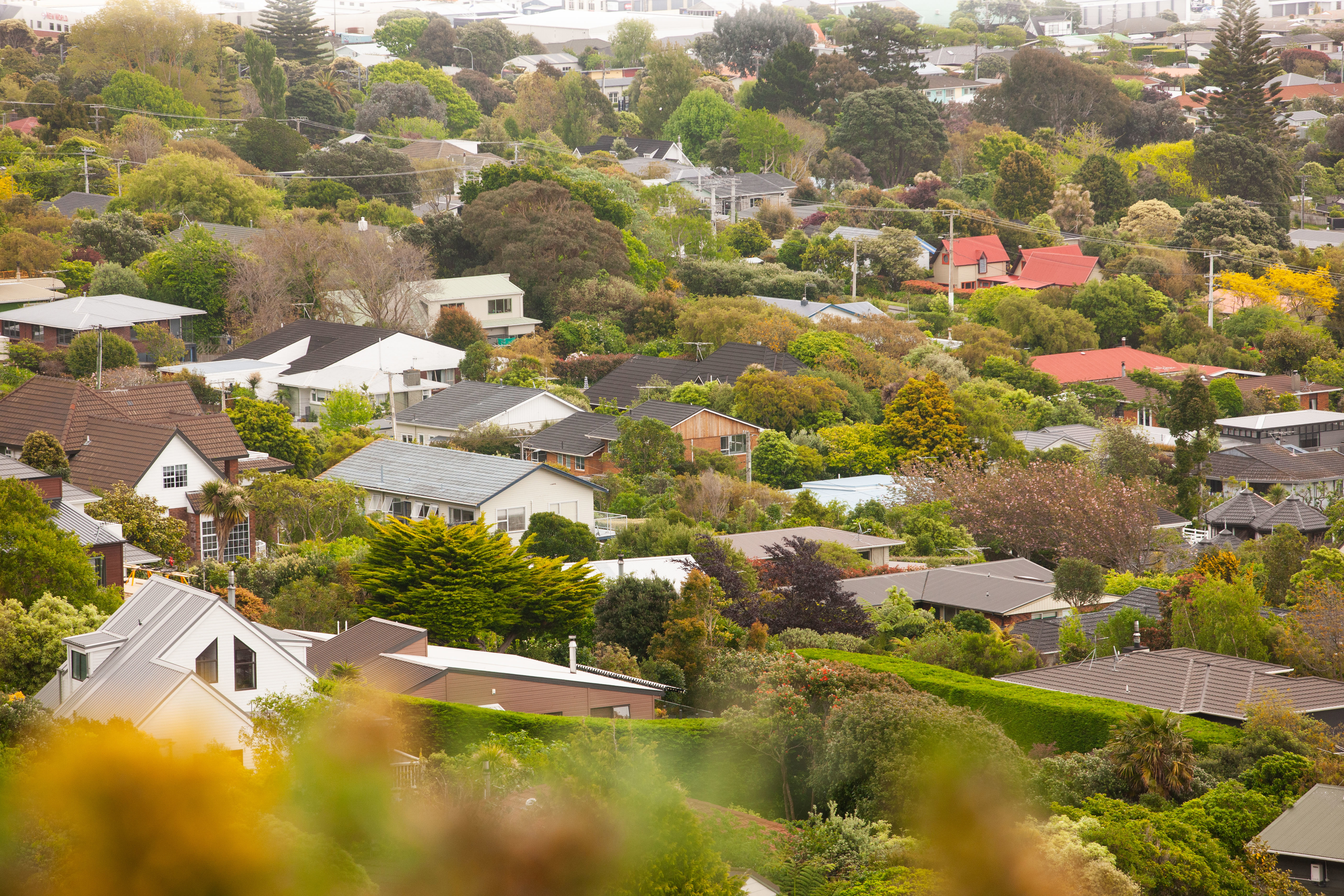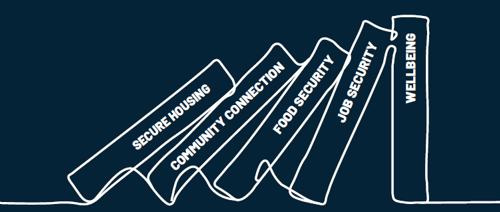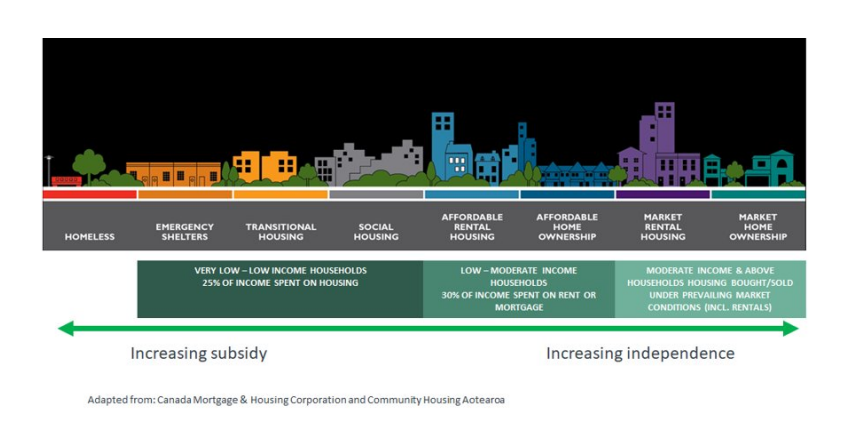Our role in housing
Like many areas in Aotearoa New Zealand, Kāpiti has increasing demand for housing, and pressure on our public housing services. What is Council's role in this and what are they doing about it?

Housing strategy
In May 2022, Council adopted the Kāpiti Coast District Council Housing Strategy 2022. This document outlines the Council’s current thinking about housing in the Kāpiti region. It includes our vision and principles, the various types of roles we can play, and actions for the short, medium and long term. It will enable us to prioritise investment and capitalise on partnership opportunities, manage risk and coordinate our housing response across other areas of our work.
The multiple roles the Council needs to play to help to deliver better housing outcomes for Kāpiti:
- regulator / service provider
- facilitator / connector / advocate
- enabler / funder
- housing provider.
Housing is a complex issue and not solely the responsibility of one organisation or sector. A key part of our strategy is to provide a foundation from which we can continue to grow productive partnerships with iwi, our partners, central government, the private sector, community housing providers and the community.
Read the housing strategy [PDF 4.8 MB]
The issue
There are significant and growing housing access and affordability issues in our district. These issues are creating stress right across the housing continuum and for some, the lack of secure housing is having a domino effect, negatively impacting many or all aspects of a person’s life.

As our population continues to grow, we expect this to put pressure on existing housing and housing stress to grow too. In fact, it is estimated that there will be 32,000 more people living in Kāpiti by 2051 and we will need 15,000+ additional dwellings to house them.
Housing stress is already being felt by many across our district, to the point that some are having to borrow money from family and friends to help pay housing costs, skip meals or change eating habits due to rising living costs, and in some cases, move out of our district away from whanau / family and friends. An increasing number of people in our community are seeking government support to access housing
All signs point to a worsening situation that if left unaddressed, will see deprivation rise and the follow-on effects of not having secure housing impact on people’s wellbeing for generations.
While the issues in Kāpiti are not as insurmountable as they seem to be in other regions across the country, it is a critical time for Kāpiti to decide what housing future it wants to see.
Read more about housing need in Kāpiti.
The housing continuum
Many in our community are finding it difficult to find affordable housing. The housing continuum helps us better understand the challenges we face and the range of housing we need to be able to meet the needs of different people at different times.

Graphic credit: The Property Group’s Housing Assessment Report.
Our changing role
In the past, Council has focused primarily on providing infrastructure, services and community facilities. We’ve had, and continue to have, a regulatory role with our district plan and issuing of building consents, and we have a portfolio of 118 older persons’ housing units.
Since April 2020, following a report by an independent specialist property consultancy, we have started to increase our focus and developed a housing work programme that includes a range of initiatives such as:
- assessing the residential land we hold to see if there’s potential for redevelopment
- engaging with our iwi partners to explore development on Māori-owned and other land
- looking into opportunities with the public housing sector to get more social housing built
- seeing if there’s suitable land that could be used for temporary relocatable housing.
In 2021, through our Long-term Plan 2021-41 consultation process, we asked the community if we should take a bigger role in housing and over half respondents agreed we should.
Improving access to housing was also included as one of five community outcomes for the long-term plan, reflecting the seriousness of the issue and Council's commitment to taking a bigger role.
Homelessness
The Ministry of Social Development (MSD) is the lead agency for people who need emergency housing support. Information about how to access and apply for emergency housing can be found on the Work and Income website, or people can pop into the MSD’s Work and Income Kapiti office in Coastlands Shopping Mall, Rimu Road, Paraparaumu.
Work to date
Since the adoption of the long-term plan in June 2021, Council has:
- conducted an in-depth Housing Needs Assessment to help illustrate the extent of the housing stress in Kāpiti, providing evidence-based results to work from and to support conversations with Government and other key stakeholders
- created a housing strategy to outline the Council’s current thinking about housing in the Kāpiti region, and set out an action plan of what we’ll do in the short, medium and long term
- consulted on a draft changes to the District Plan to meet new Government requirements to enable more medium density housing and higher development in local and town centres to help address the district’s housing shortage
- worked with iwi to develop new rules for the District Plan to make it easier to build papakāinga
- had ongoing conversations with key government agencies, iwi, community housing organisations and developers to build understanding of the issues in Kāpiti, and to encourage greater investment in housing in our district that better targets what is most needed
- Applied to the Government’s Infrastructure Acceleration Fund targeted at key infrastructure delivery in Ōtaki.
Next steps
The Housing Strategy sets out a comprehensive range of actions. Delivery of these actions are our key next steps. Some actions are already under way and others will need more detailed planning. This will include current and planned housing projects and initiatives and how these will be sequenced.
Further planning will dig deeper into the right solutions to address the challenges that Kāpiti faces with regards to housing and will:
- help to prioritise investment, and coordinate delivery with other partner organisations and stakeholders, and
- enable management of opportunities and risks, while focusing on the delivery of the strategy’s objectives
The Housing Strategy includes measures that will be used to track changes and trends in the housing issues faced in Kāpiti. These will be reported on annually. Council’s work programme will be updated regularly, to reflect the most up-to-date information about how Council is responding to the changing landscape impacting the housing market.
Kāinga Ora purchase plot in Raumati Road
The comprehensive insights into the housing story of Kāpiti captured through our housing needs assessment in 2022 have contributed to a decision by central government to further invest in public housing in the district.
While the project is in the very early stages, Kāinga Ora has purchased a large vacant plot of land at 59–69 Raumati Road in Raumati Beach and, if the site is developed, initial estimates suggested 100 warm, dry homes could be delivered on the 4.6360-hectare site.
Kāinga Ora have indicated they will work closely with Council, iwi and local residents on how best to make sure these homes support the local community and new residents.
Read more at Investing in the future of the Kāpiti Coast: Kāinga Ora – Homes and Communities
- Growth Strategy, Te Tupu Pai – Growing Well, provides a vision and road map for how the district will grow sustainably over the next 30 years
- Open Space Strategy, sets in place a vision for protecting and enhancing the district’s awesome network of parks and reserves, urban space and pathways for the next 30 years
- District Plan changes to meet new Government requirements
- Ministry of Social Development - housing and support services [Ministry of Social Development]
- Ministry of Housing and Urban Development
- Kāinga Ora – Homes and Communities
- Community Housing Aotearoa
- Kāpiti’s Housing and Business Development Capacity Assessment and quarterly monitoring reports
- Housing for older persons
- Māori and Iwi Housing Innovation Framework for Action (MAIHI)
- Māori Housing Support
- Public housing regional factsheets (HUD)